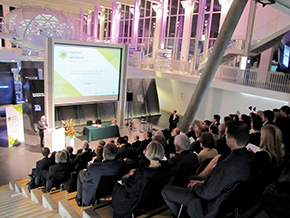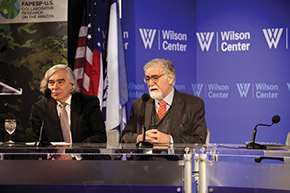
HEITOR SHIMIZU / FAPESPFAPESP Week Munich: promising contacts in the fields of photonics, energy, and chemistryHEITOR SHIMIZU / FAPESP
FAPESP held another edition of its international FAPESP Week symposia at California’s UC Berkeley and UC Davis campuses on November 17-21, 2014, with the support of the Wilson Center. Representing a gamut of fields, scientists from research institutions in São Paulo and the United States had the opportunity to forge tighter bonds and foster collaborative work. Beijing, China, was site of the year’s first FAPESP Week, held in April 2014. In October, the event took place in Munich, Germany. “These symposia can lend visibility to the science done in São Paulo and can link our researchers to the world,” said Marcelo Knobel, professor at the University of Campinas (Unicamp) and deputy coordinator of the FAPESP Area Panel on Collaboration in Research. Convened at the Deutsches Museum on October 15-17, FAPESP Week Munich was attended by an audience of around 170, including representatives of the German government, the Bavarian state government, FAPESP, and teaching and research institutions from both nations. FAPESP signed two new cooperation agreements during the symposium, one with the Ministry of Education and Research of the Federal Republic of Germany and the other with the University of Münster.

MICHAEL DARDEN / BRAZIL INSTITUTE, WILSON CENTERUS Secretary of Energy Ernest Moniz and FAPESP President Celso Lafer in Washington: collaborative research on the AmazonMICHAEL DARDEN / BRAZIL INSTITUTE, WILSON CENTER
“Many researchers from Brazil made arrangements to continue their conversations with German groups, especially in the fields of photonics, energy, and chemistry,” said Knobel. Ludwig Spaenle, Minister of Education, Science, and the Arts for the State of Bavaria, stressed the importance of internationalizing research. “We are looking for strong partners and there are many to be found in São Paulo,” he said. Likewise in October 2014, FAPESP and the US Department of Energy (DOE) organized a symposium in Washington, DC, to assess research now underway as part of the Green Ocean Amazon initiative (GOAmazon), conducted under a 2013 call for proposals by the DOE, FAPESP, and the Amazonas Research Foundation (FAPEAM). Held on October 28, the event brought together more than 120 scientists, biodiversity conservation experts, and journalists. “We need the best scientists to understand the changes taking place in tropical forests,” said Ernest Moniz, US Secretary of Energy. FAPESP President Celso Lafer highlighted the scientific and diplomatic nature of the partnership. “Researchers from Brazil and the United States share common values linked to the merits of scientific investigation. In a world full of tensions, this is something that makes this kind of effort an exercise in building knowledge and cooperation,” he said.
Republish